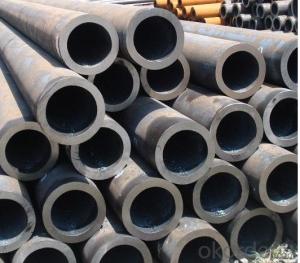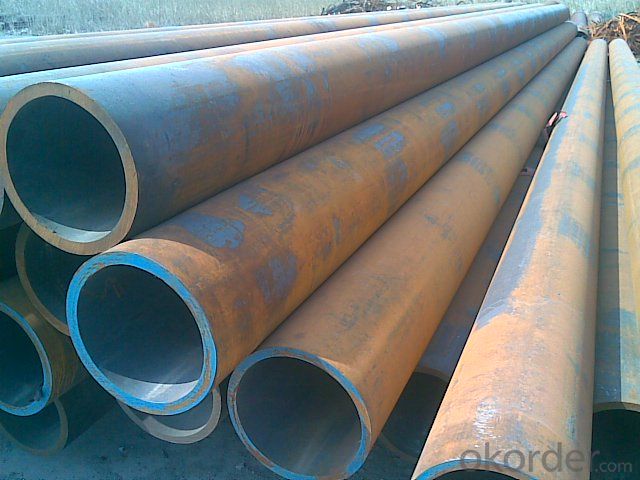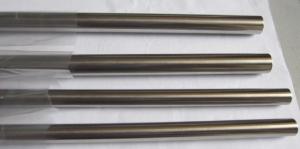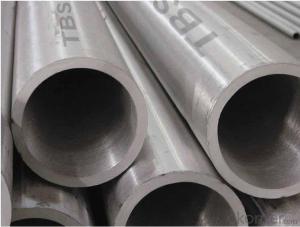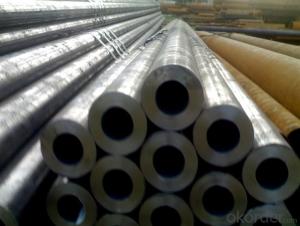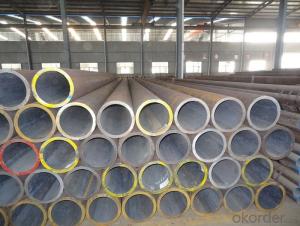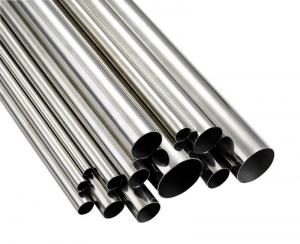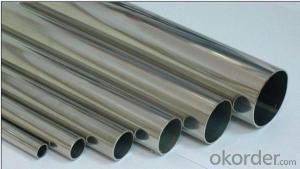ASTM A335 Seamless Ferritic Alloy-Steel Pipe for High-Temperature Service
- Loading Port:
- Shanghai
- Payment Terms:
- TT OR LC
- Min Order Qty:
- 1000 kg
- Supply Capability:
- 10000 kg/month
OKorder Service Pledge
OKorder Financial Service
You Might Also Like
Packaging Detail: | Bundle or Container or as per customers requirement. |
Delivery Detail: | within 25 days after we receive an irrevocable L/Cor 30% deposit |
ASTM A335 Seamless Alloy-Steel Pipe
Standard: BS 1139, BS 3059-2, JIS G3454-2007
Grade: 10#-45#, 15NiCuMoNb5, 10Cr9Mo1VNb
Detailed introduction to ASTM A335 seamless alloy steel pipe:
ASTM A335 seamless alloy steel pipe
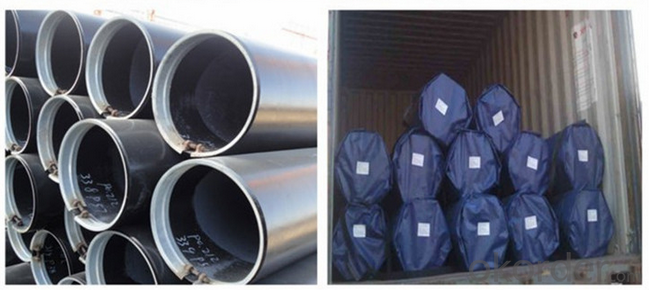
some mechanical property
Standard | Model | Tensile Strength (Mpa) | Yield Strength (Mpa) | Elongation Rate (%) | Hardness |
GB3087 | 10 | 335~475 | ≥195 | ≥24 | / |
20 | 410~550 | ≥245 | ≥20 | / | |
GB5310 | 20G | 410~550 | ≥245 | ≥24 | / |
20MnG | ≥415 | ≥240 | ≥22 | / | |
25MnG | ≥485 | ≥275 | ≥20 | / | |
15CrMoG | 440~640 | ≥235 | ≥21 | / | |
12Cr2MoG | 450~600 | ≥280 | ≥20 | / | |
12Cr1MoVG | 470~640 | ≥255 | ≥21 | / | |
12Cr2MoWVTiB | 540~735 | ≥345 | ≥18 | / | |
10Cr9Mo1VNb | ≥585 | ≥415 | ≥20 | / | |
ASME SA210 | SA210A-1 | ≥415 | ≥255 | ≥30 | ≤143HB |
SA210C | ≥485 | ≥275 | ≥30 | ≤179HB | |
ASME SA213 | SA213 T11 | ≥415 | ≥205 | ≥30 | ≤163HB |
SA213 T12 | ≥415 | ≥220 | ≥30 | ≤163HB | |
SA213 T22 | ≥415 | ≥205 | ≥30 | ≤163HB | |
SA213 T23 | ≥510 | ≥400 | ≥20 | ≤220HB | |
SA213 T91 | ≥585 | ≥415 | ≥20 | ≤250HB | |
SA213 T92 | ≥620 | ≥440 | ≥20 | ≤250HB | |
DIN17175 | ST45.8 | 410~530 | ≥255 | ≥21 | / |
15Mo3 | 450~600 | ≥270 | ≥22 | / | |
13CrMo44 | 440~590 | ≥290 | ≥22 | / | |
10CrMo910 | 480~630 | ≥280 | ≥20 | / |
Chemical Composition (%) | ||||||||||||||
Grade | C | Si | Mn | P | S | Cr | Mo | Cu | Ni | V | Al | W | Nb | N |
P11 | 0.05~0.15 | 0.5~1.0 | 0.3~0.6 | ≤ 0.03 | ≤ 0.03 | 1.0~1.5 | 0.5~1.0 | |||||||
P12 | 0.05~0.15 | ≤ 0.5 | 0.3~0.61 | ≤ 0.03 | ≤ 0.03 | 0.8~1.25 | 0.44~0.65 | |||||||
P22 | 0.05~0.15 | ≤ 0.5 | 0.3~0.6 | ≤ 0.03 | ≤ 0.03 | 1.9~2.6 | 0.87~1.13 | |||||||
P5 | ≤ 0.15 | ≤ 0.5 | 0.3~0.6 | ≤ 0.03 | ≤ 0.03 | 4.0~6.0 | 0.45~0.65 | |||||||
P91 | 0.08~0.12 | 0.2~0.5 | 0.3~0.6 | ≤ 0.02 | ≤ 0.01 | 8.0~9.5 | 0.85~1.05 | ≤ 0.4 | 0.18~0.25 | ≤ 0.015 | 0.06~0.10 | 0.03~0.07 | ||
Mechanical Properties | ||||||||||||||
Grade | Tensile strength(MPa) | Yield strength(MPa) | Elongation(%) | Impact energy(J) | Hardness | |||||||||
P11 | ≥ 415 | ≥ 205 | ≥ 22 | ≥ 35 | ≤ 163HB | |||||||||
P12 | ≥ 415 | ≥ 220 | ≥ 22 | ≥ 35 | ≤ 163HB | |||||||||
P22 | ≥ 415 | ≥ 205 | ≥ 22 | ≥ 35 | ≤ 163HB | |||||||||
P5 | ≥ 415 | ≥ 205 | ≥ 22 | ≥ 35 | ≤ 187HB | |||||||||
P91 | 585~760 | ≥ 415 | ≥ 20 | ≥ 35 | ≤ 250HB | |||||||||
P92 | ≥ 620 | ≥ 440 | ≥ 20 | ≥ 35 | 250HB | |||||||||
FAQ:
1) why you chose us ?
Professional Manufacturer and supplier of Steel pipe
More than 14 years’ professional producing experience
We can get the lowest ex-factory prices. The price are quite reasonable and it is lower than our commercial peers. also, we can guarantee the qualities of our products.
BV, ISO certificates and SGS test can be provided to assure the quality of our products.
2) Our minimum order quantity:
10 Metric Tons or one 20ft or 40ft Container.
3) How about the Delivery Time?
The steel pipe will be produced since we getting your deposit by T/T or Your original L/C. For normal size, some stocks in our factory now, we can supply once you need.
4)What kind of payment does your company support?
T/T, 100% L/C at sight, Cash, Western Union are all accepted.
5) Do you charge for the samples?
According to our company principle, we just charge for samples, you pay for the freight /courier charge.
6) Main market:
Mid East, South America, Africa, Southeast Asia, India etc
- Q: How do steel pipes compare to other materials, such as PVC or copper?
- Steel pipes are generally considered to be stronger and more durable compared to materials like PVC or copper. While PVC pipes are lightweight and easy to install, they are not as strong as steel and can be more prone to cracking or breaking. Copper pipes, on the other hand, are known for their corrosion resistance and are commonly used for plumbing systems. However, steel pipes have the advantage of being highly resistant to extreme temperatures, pressure, and damage, making them suitable for a wide range of applications, including industrial and commercial use.
- Q: How are steel pipes used in the manufacturing of heat exchangers?
- Steel pipes are commonly used in the manufacturing of heat exchangers due to their strength, durability, and ability to withstand high temperatures and pressures. These pipes are typically used to create the primary heat transfer surfaces within the heat exchanger, allowing for efficient transfer of heat between two fluids. The steel pipes are often arranged in a coil or tube bundle configuration, providing a large surface area for heat exchange to occur. Additionally, the corrosion-resistant properties of steel make it an ideal choice for handling various fluids in heat exchanger applications.
- Q: How are steel pipes used in hydroelectric power plants?
- Steel pipes are used in hydroelectric power plants to transport water from the reservoir to the turbines. These pipes are able to withstand high pressure and ensure a reliable flow of water, which is crucial for the efficient operation of the turbines. Additionally, steel pipes are also used for the construction of penstocks, which control the flow of water and direct it towards the turbines.
- Q: Can steel pipes be used for both high-pressure and low-pressure systems?
- Yes, steel pipes can be used for both high-pressure and low-pressure systems. Steel pipes are known for their durability and strength, making them suitable for various applications, including both high and low-pressure systems. However, it's important to consider the specific requirements and regulations of the system to ensure the appropriate type and grade of steel pipe is selected for optimal performance and safety.
- Q: What are the safety precautions while working with steel pipes?
- When working with steel pipes, it is important to follow several safety precautions. Firstly, always wear protective gear such as gloves, safety glasses, and steel-toed boots to prevent injuries. Secondly, ensure that the work area is properly ventilated to avoid inhaling harmful fumes or gases. Additionally, use caution when handling heavy pipes to prevent strains or sprains. Lastly, be mindful of potential hazards such as sharp edges, hot surfaces, or falling objects, and take appropriate measures to minimize risks.
- Q: How are steel pipes used in industrial manufacturing processes?
- Steel pipes are commonly used in industrial manufacturing processes for various purposes such as transporting fluids, gases, and solids, providing structural support, and facilitating heat transfer. They are used in industries like oil and gas, construction, automotive, and manufacturing, where they are utilized for plumbing systems, conveyance of materials, and as a durable and reliable medium for handling high-pressure and high-temperature applications.
- Q: How are steel pipes tested for pressure and leakage?
- Steel pipes are tested for pressure and leakage through various methods including hydrostatic testing, pneumatic testing, and ultrasonic testing. Hydrostatic testing involves filling the pipe with water and applying pressure to check for any leaks or weaknesses. Pneumatic testing involves using compressed air instead of water. Ultrasonic testing uses high-frequency sound waves to detect any flaws or defects in the pipe material. These testing methods ensure that steel pipes meet the required standards for pressure and leakage resistance.
- Q: What is the difference between steel pipe and concrete pipe?
- Steel pipe and concrete pipe are commonly used for various applications, but they have significant differences in material composition and properties. To begin with, the primary distinction lies in the materials utilized to manufacture these pipes. Steel pipes consist of steel, an alloy of iron and carbon. Conversely, concrete pipes are composed of a mixture of cement, aggregate (such as sand or gravel), and water. Additionally, steel pipes are renowned for their strength and durability. They can withstand high pressure, making them suitable for transporting fluids or gases under high pressure. Steel pipes also possess high resistance to corrosion, which is advantageous in environments exposed to moisture or chemicals. In contrast, concrete pipes are not as sturdy as steel pipes and are more prone to cracking or damage under high pressure. Nevertheless, they can still handle moderate pressure loads and are often employed in drainage systems or sewage applications. Another noteworthy difference is the installation process. Steel pipes are typically joined together through welding techniques like butt welding or socket welding, creating a seamless and robust connection between the pipes. Conversely, concrete pipes are often installed using rubber or gasketed joints, which are simpler to assemble and disassemble. Cost is another factor where steel and concrete pipes diverge. Steel pipes tend to be more expensive due to the higher cost of steel as a raw material and the additional labor required for welding and fabrication. On the other hand, concrete pipes are generally more cost-effective as the materials used in their production are more readily available and the installation process is simpler. In summary, the main disparities between steel pipes and concrete pipes revolve around their material composition, strength, resistance to corrosion, installation process, and cost. Steel pipes offer superior strength and durability, making them suitable for high-pressure applications and environments prone to corrosion. Concrete pipes, while not as robust, are cost-effective and commonly used in drainage systems or sewage applications.
- Q: What are the different types of coatings used on steel pipes?
- There are several different types of coatings used on steel pipes, including polyethylene, fusion bonded epoxy, coal tar enamel, and asphalt enamel. These coatings provide protection against corrosion, abrasion, and other forms of damage, ensuring the longevity and durability of the steel pipes.
- Q: How are steel pipes used in automotive manufacturing?
- Steel pipes are commonly used in automotive manufacturing for various applications such as exhaust systems, fuel lines, and structural components. They provide durability, strength, and corrosion resistance, making them suitable for withstanding the harsh conditions and high temperatures associated with automotive operations. Additionally, steel pipes offer flexibility in design and can be easily formed and manipulated to meet specific requirements, ensuring efficient and reliable performance in vehicles.
Send your message to us
ASTM A335 Seamless Ferritic Alloy-Steel Pipe for High-Temperature Service
- Loading Port:
- Shanghai
- Payment Terms:
- TT OR LC
- Min Order Qty:
- 1000 kg
- Supply Capability:
- 10000 kg/month
OKorder Service Pledge
OKorder Financial Service
Similar products
Hot products
Hot Searches
Related keywords
